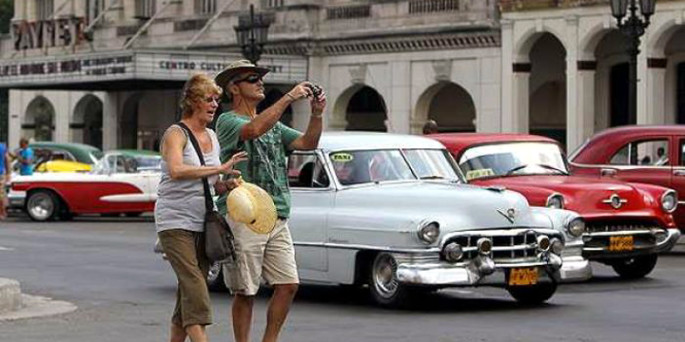
Gearing up for the real tourist season
HAVANA — It’s Friday, Feb. 6. José Martí International Airport, round about midnight. A Brazilian couple in their 50s, a bit adventurous and not very farsighted, find themselves marooned outside the terminal, without the slightest idea of where they’ll spend the first night of the ten that they hope to spend on the island.
If that situation were made into a movie, the best soundtrack would be that tune by the Van Van (very popular at the time) that drove people to dance, with Hugo blowing into his trombone and the others singing a prophetic chorus: “No bed for so many folks.”
And we can be sure that the predictable avalanche of Americans will be the closest thing to one of those races — greyhounds, horses or sprint runners — where the contestants wait for the gun to rush to their destination. That, as my grandmother used to say, will be “the end-all.”
Tourists need a magnifying glass to find room in the more than 500 private homes that provide lodging to tourists in Old Havana. They’re an alternative to the major hotels, considering that the budget of many travelers doesn’t allow for a luxury suite and $7 bottles of Seven-Up in a country where thirst is a constant and perspiration hangs on you 24/7.
I feel sorry for those Brazilians, who look like shipwreck survivors, and I use my cell phone to locate friends or acquaintances who rent rooms, from the sublime to the unimaginably simple. All rooms taken. Nothing for now. Will have to wait.
The rental of rooms, apartments, houses, residences and even mini-palaces is booming and becoming a profitable business. And that — despite the taxes, which are not as excessive as before and shouldn’t rise by whim of the fiscal authorities — is a good business because, among other reasons, it furnishes employment to many people who are indispensable in the process of welcoming visitors as required by our traditional hospitality.
Doing “support chores” are unemployed people or retirees who clean, cook, wash, do errands. There’s the electrician, the plumber, the carpenter, the flower vendor, the driver who picks up tourists and takes them to places of interest, and even that little old lady whose only skill is to make corn tamales to supplement her income. “Support work” is a giant udder to which uncounted people cling.
Everybody prospers. Even the State, by the simple act of granting work permits and then collecting taxes, the way a priest collects the offerings at Mass. Those individual entrepreneurs form a cottage industry that some describe as “the blood that moves the people’s economy.”
Yet, there are detractors out there who are willing to lose an eye just to render an opponent blind. From the basic levels of society to posts of great political, business or governmental responsibility, some people do not approve of the development and flourishing of these activities, even though those self-employed workers have the support of the highest levels of government and the Communist Party, because they deserve to make a living and survive.
The “gringo” contingent is still to come. It will be an earthshaking event that will test the weak infrastructure we have today for wholesale tourism. For a while now, analysts and specialists have predicted that we may be looking at 4 million Americans a year. We’ll have to prepare and make sure that the government is not forced to approve exceptional measures to provide shelter for our northern visitors.
The people feel it coming and prepare for it, in terms of lodging and food services, with five-star restaurants that include a sommelier with a long wine list under his arm, and even warm towels in the washroom.
A great moment nears, when a smart young man with financing and qualifications will not need to leave his homeland to try his luck in another country where he will be just another foreigner, another immigrant living and working “under a different culture,” as the song said.
The Brazilian couple? They finally found lodging in the Playa district, across the street from a farmer’s market, not far from the sign from a language school that says you can learn English in three months. Something like learning to drive a car in 72 hours.
Just so you get the picture, January ended with an inflow of 371,160 tourists, 51,097 more than in January of last year. Time is money, in more ways than one.

